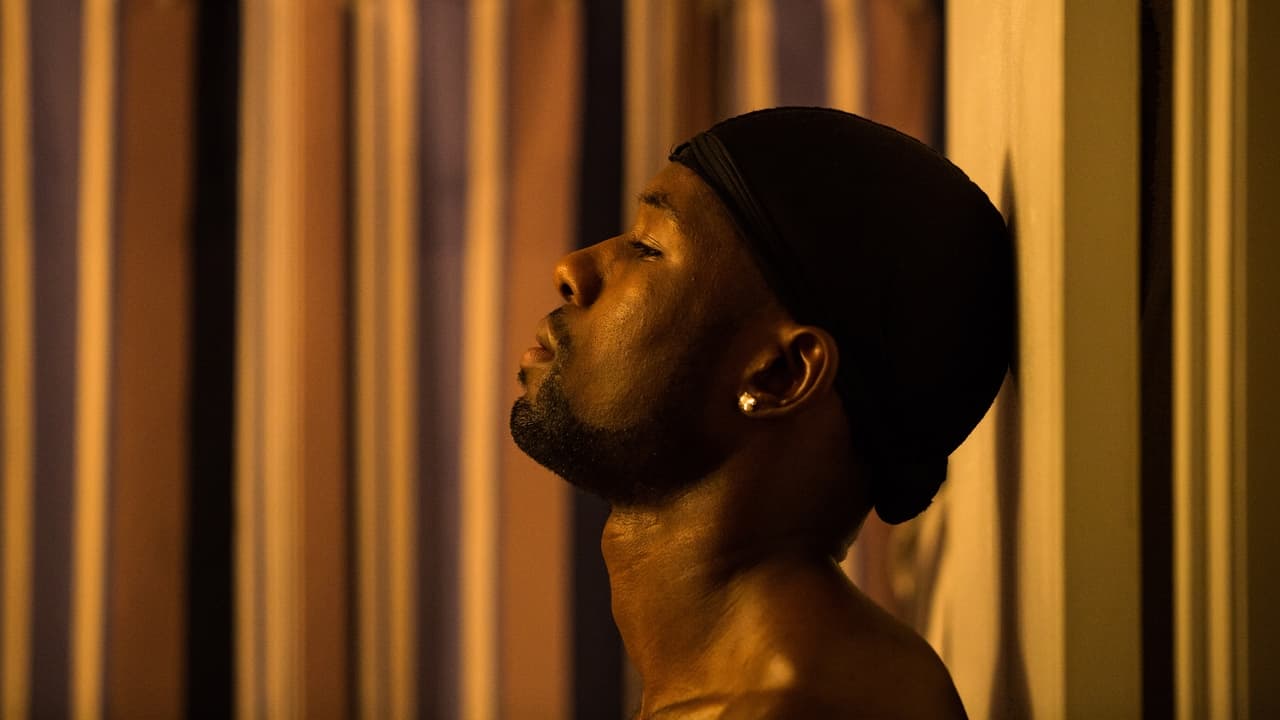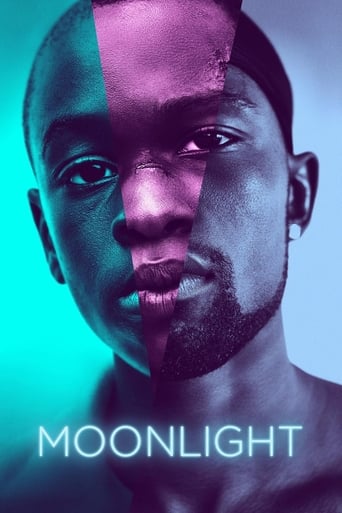EarDelightBase
Waste of Money.
Dynamixor
The performances transcend the film's tropes, grounding it in characters that feel more complete than this subgenre often produces.
BallWubba
Wow! What a bizarre film! Unfortunately the few funny moments there were were quite overshadowed by it's completely weird and random vibe throughout.
AutCuddly
Great movie! If you want to be entertained and have a few good laughs, see this movie. The music is also very good,
livshapps
Moonlight is a purely beautiful film. From beginning to end, the stunning cinematography, compelling characters and subtle but effective storytelling create a masterpiece of a work that leaves the audience in awe. Common critiques include complaints of slow pacing and lack of subject matter, and while the film definitely takes its time in the first two acts, the latter could not be more untrue.Those used to hasty, oversaturated and uninspiring plots found in many of today's high-grossing films are, of course, going to struggle with Moonlight. This film makes textbook-equivalent use of the "show, don't tell" rule. This is not a feature for individuals who require stories to be spelled out to them. Moonlight is an exploration of the heart and soul, and of what it means to live as true to oneself. The themes of this film are present in every second of its runtime. In the conversations between mother and son, in the tender gazes between two childhood best friends-turned pining lovers. An important point worth mentioning is, of course, the treatment of these marginalized characters. The LGBT community's presence in cinema has been long standing, but poorly acknowledged. This is especially true of black and brown LGBT folk. Representation in media comes at a constant risk of falling into detrimental stereotypes, and very often it does. I come to expect this from every movie about gay characters. Therefore, going into Moonlight, I was naturally worried. Worried that I would have to endure yet more disappointment. As I watched the majority of the film through bated breath, I wondered what the outcome of our protagonist would be. To my surprise, I was greeted not with a painful and heartwrenching conclusion involving death or rejection, but with acceptance and comfort. The ending to this film left me crying not tears of sadness, but of affection. I have to admit that every time I watch Moonlight, I feel a familiar softness in my heart, a sort of vulnerability that overtakes me. The beauty of the writing and expert portrayal by the actors, wrapped up in engaging visuals along with a magnificent score make for one of the most gorgeous, touching, and fulfilling films of all time.
zardoz-13
Altogether a memorable, solidly made film, the 2017 Oscar winning Best Picture "Moonlight" has little to distinguish it from the other nominees in the same category of Best Picture aside from its LGBQT content. Despite strong performances by a uniformly gifted cast, director Barry Jenkins' second feature-length film (everything else has been classified as a 'short') looks and sounds familiar. We have another African-American drama high school set in the inner city (Liberty City) of the thriving metropolis of Miami, Florida, and the underdog protagonist Chiron is the product of a broken home who suffers mercilessly at the hand of intimidating bullies. Chiron's mother is just as heartless as the school bullies who harass him without let-up. Predictably, the moment he retaliates against his chief adversary Terrell (newcomer Patrick Decile), our protagonist finds himself clapped into handcuffs and packed off to prison. Sometimes, stories like this appall me, because the lead character-Chiron (variously played at different ages by Alex Hibbert, Ashton Sanders, and eventually Trevante Rhodes), has found life a challenge from the start and ordeal in progress. To say that Chiron has been treated unfairly is an understatement. Ironically, prison seems to be a break for him because it regenerates him into a strong, intelligent, perceptive man. Meantime, Chiron's single-mother Paula (beautifully played by a dolled-down Naomie Harris of "Spectre") is addicted to crack and spends time with a variety of men, often driving Chiron away from home to fend for himself. Briefly, Chiron finds a father figure in a Cuban dope dealer, Juan (Mahershala Ali of "Hidden Figures"), who takes him in with his girlfriend Teresa (Janelle Monáe of "Hidden Figures") and raises him during the moments that he has with him. For example, Juan advises Chiron to never sit with his back to a door because he won't know who is sneaking up behind him. Unfortunately, Chiron is as clueless about this as he is about life in general. He knows that the other kids at school ridicule him and want to use him as a punching bag. Eventually, one truculent student Terrel (newcomer Patrick Decile) compels Chiron's best friend in high school, Kevin (Jharrel Jerome) to unload on him in the playground, knocking him down three times while everybody else watches but nobody says anything. What bothers Chiron the most is the word 'faggot,' and Juan tells him frankly what it means. "A faggot is... a word used to make gay people feel bad," Juan explains. Nevertheless, Juan adds, "You can be gay, but you don't have to let nobody call you a faggot." Eventually, a hopelessly confused Chiron has his first sexual encounter with an apparently heterosexual friend, Kevin (Jharrel Jerome) and later feels betrayed when Kevin slugs him thrice at Terrel's insistence. "Moonlight" occurs in three phases of Chiron life. First, he is an adolescent dealing with his hateful mother. Second, he is a high school student struggling for help. Third, he is a grown man with a body like Hercules. For the sake of closure, Jenkins doesn't tell us what happened to Terrel. We see him sprawled in the floor of the classroom after Chiron has shattered a chair across his back. The moment that Chiron resorts to physical violence to attack Terrel was one of the more liberating moments in "Moonlight." Despite everything that Chiron suffers through from homeless to prison, he emerges as a self-aware individual who doesn't behave like a domino pushing others around because he had been pushed around."Moonlight" is a good film, but it is not a great film. The Best Picture Oscar "Moonlight" took home virtually guarantees that this social melodrama will never be forgotten. Academy had shunned African-Americans in previous years. Mahershala Ali deserved his Best Supporting Actor Oscar for his quiet, restrained performance. The third Oscar for Best Adapted Screenplay by Barry Jenkins and Tarell Alvin McCraney, based on his previously unpublished play "In Moonlight Black Boys Look Blue" is deserved, too. According to reports, Jenkins and McCraney both attended the same schools in Liberty City, but they were not friends at the time. Although the film concerns controversial subject matter, Jenkins never shows any overt sexual scenes with nudity, apart from a kiss between Kevin and Chiron and the groans of orgasm when they sit together.
ronak-57610
The worst movie i have ever seen.
The worst movie i have ever seen
The worst movie i have ever seen
The worst movie i have ever seen
The worst movie i have ever seen
proud_luddite
In three stages of life - youth, adolescence, and young adulthood - the life story of Chiron is told. Chiron is an African-American who grows up in a poor, black community in Miami and later moves to Atlanta. His early life is plagued by bullies and a difficult home life as his single mother is very troubled. During these bad times, he is consoled by surrogate parents that he visits occasionally and his friend Kevin with whom he shares a sexual attraction in the teen years.The scenes of bullying are so accurate that they are sometimes difficult to endure. They include the "blame the victim" mindset that too often accompanies bullying. Luckily, there is relief in lighter scenes such as when Chiron visits his surrogate parents where a bond is clearly growing.There is a brilliant scene at the end when the adult versions of Chiron (Trevante Rhodes) and Kevin (André Holland) are reunited. The mutual sexual tension between the actors under Jenkins' guided hand create a very unique scenario leaving the viewer on edge, wondering what will happen next. Will they actually connect? (It's also fascinating how they resemble the pair in "Brokeback Mountain" where one partner is more outgoing while the other is more reserved and afraid due to his difficult past. The same match also occurred in "Being 17".)This perfect scene is unfortunately cut too short. If it had continued at the same pace and the viewer saw the men connect, I would have given this film as high a rating as most others are giving it. It's hard to guess why Jenkins (also the film's writer based on a story by Tarell Alvin McCraney) made this choice. It may be the general sexist attitude among filmmakers regarding love scenes between same-sex couples. When such scenes are between two women, their naked bodies are seen flailing across the screen for several minutes but this is rarely, if ever, the case when the bond is between two men. To use the clichéd excuse of "leaving the rest to the viewer's imagination" is a cowardly cop-out. Another reason an extended love scene would have worked: the love would have helped balance the many hardships exposed in the beginning. This criticism is not so much against "Moonlight" but against the film industry in general. In fairness, "Moonlight" is more courageous than most films.There is much else to praise in "Moonlight". In addition to the great performances by Rhodes and Holland (who also create great chemistry together), there are also praiseworthy performances by Naomie Harris as Chiron's mother (her final scene is a standout) and Mahareshala Ali as Chiron's surrogate father in the film's beginning. Credit must also be given to the young actors who played the younger versions of both Chiron (Alex Hibbert and Ashton Sanders) and Kevin (Jaden Piner and Jharrel Jerome). Much discussion has occurred lately regarding the under-utilization of the very talented pool of black actors. When movies like this one use such talent so generously, all moviegoers benefit.

